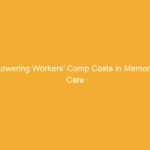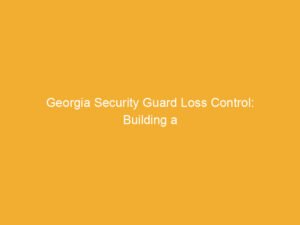Security Guard Workers’ Comp Certificates: Fast Tracking for Client Contracts
August 9, 2025
Lowering Workers’ Comp Costs in Memory Care Facilities With Ergonomics Training
August 9, 2025In today’s rapidly evolving security landscape, organizations across Georgia face increasingly complex risks that demand proactive strategies to safeguard assets, personnel, and reputation. Effective loss control measures are no longer optional-they are essential components of a complete security program. This article explores the pivotal role of security guard loss control in fostering a culture of safety within businesses and institutions throughout Georgia. By implementing best practices, leveraging technology, and cultivating a workforce committed to risk mitigation, organizations can considerably reduce incidents, enhance operational resilience, and protect their bottom line. Join us as we examine key approaches to building a robust safety culture that empowers security teams to anticipate, prevent, and respond to potential threats with confidence and professionalism.
Table of Contents
- Enhancing Risk Assessment Protocols for Proactive Loss Prevention
- Implementing Comprehensive Training Programs to Strengthen Guard Competencies
- Leveraging Technology to Monitor and mitigate Security Threats
- fostering Collaborative Incident Reporting and Continuous Improvement Practices
- Q&A
- Insights and Conclusions
Enhancing Risk Assessment Protocols for Proactive Loss Prevention
Integrating advanced data analytics into risk assessment enables security teams in georgia to identify vulnerabilities with unprecedented precision.By systematically evaluating both historical incidents and real-time operational data, decision-makers can anticipate potential threats before they escalate into losses. This approach involves:
- Regular environmental scans to detect emerging risks specific to each facility.
- Behavioral analysis to recognize patterns indicating unauthorized access or suspicious activities.
- Technological audits to ensure security systems remain robust against evolving tactics.
Along with these practical steps,fostering a culture where personnel at every level are actively engaged in risk mitigation is essential. Empowering guards with ongoing training, clear dialog channels, and accountability mechanisms transforms passive observation into proactive intervention. The following table outlines critical elements of an optimized risk assessment protocol that security departments can implement immediately:
| Component | Key Feature | Benefit |
|---|---|---|
| Automated Reporting | Real-time incident alerts | Immediate response initiation |
| Risk Scoring | Quantitative vulnerability metrics | Prioritized mitigation efforts |
| Scheduled Audits | Routine security system evaluations | Sustained operational integrity |
Implementing Comprehensive Training Programs to Strengthen Guard Competencies
Elevating the skill set of security personnel requires a strategic approach that integrates practical knowledge with hands-on experience. Effective training programs focus not only on situational awareness and physical readiness but also on critical thinking and communication skills.By incorporating scenario-based exercises and technology-driven simulations, guards can better anticipate potential risks and respond swiftly to evolving situations. This multifaceted approach ensures guards are not only prepared to handle diverse threats but also contribute positively to the overall security ecosystem.
Successful implementation revolves around continuous improvement and regular evaluation. Key components include:
- Interactive Workshops: For fostering teamwork and stress management.
- Certification Pathways: Ensuring alignment with industry standards and regulations.
- Performance Analytics: Utilizing data to identify skills gaps and tailor future trainings.
| Training Module | Focus Area | Duration | Outcome |
|---|---|---|---|
| Risk Assessment | Threat Identification | 4 hours | Enhanced situational awareness |
| Physical Tactics | Defensive Techniques | 6 hours | Improved response efficacy |
| Communication Skills | Conflict Resolution | 3 hours | Clear and concise reporting |
| Legal Compliance | Regulatory Knowledge | 2 hours | Reduced liability risks |
Leveraging Technology to Monitor and Mitigate Security Threats
Integrating advanced technological solutions has become indispensable in enhancing the effectiveness of security operations across Georgia. Security teams are increasingly leveraging real-time surveillance systems, AI-based threat detection software, and mobile monitoring apps to maintain constant vigilance over sensitive areas. These tools provide immediate alerts and comprehensive analytics, empowering guards to respond swiftly and accurately to potential risks while reducing manual oversight requirements. The use of automated incident reporting and cloud-based data storage also facilitates seamless communication and efficient documentation, ensuring that every security event is tracked with precision for future analysis and continuous improvement.
To optimize the impact of these technologies, organizations adopt a multi-layered approach that emphasizes both prevention and mitigation. Key components include:
- Predictive Analytics: Utilizing historical data to anticipate possible security breaches and allocate resources proactively.
- Wearable Technology: Equipping guards with smart devices to enhance situational awareness and enable hands-free communication.
- Remote Monitoring: Access to live feeds from multiple locations, allowing supervisors to coordinate responses and dispatch support swiftly.
- Cybersecurity Integration: Safeguarding digital infrastructure to prevent cyber-attacks that could compromise physical security systems.
| Technology | Benefit | Application |
|---|---|---|
| AI Surveillance | Enhanced Detection Accuracy | real-time threat alerts |
| Mobile Apps | Improved Guard Mobility | On-the-go incident reporting |
| Cloud Storage | Reliable Data Access | Centralized security logs |
Fostering Collaborative Incident Reporting and Continuous Improvement Practices
Encouraging transparent and collaborative incident reporting transforms safety challenges into proactive learning opportunities. When team members feel supported in sharing detailed observations without fear of blame, it cultivates a culture where issues are identified early and addressed swiftly. Empowering guards and supervisors to actively communicate ensures that risks are understood holistically, promoting shared responsibility and informed decision-making. Key facilitators include:
- Implementing user-friendly digital reporting platforms accessible via mobile devices
- providing regular training on the importance and process of incident documentation
- Recognizing and rewarding contributors who uphold proactive safety behaviors
Continuous improvement thrives through iterative analysis of reported events and feedback loops that engage all levels of the security team. Establishing cross-functional review committees helps dissect root causes and develop tailored corrective actions that align with onsite realities. Below is a simplified framework illustrating stages of this improvement cycle:
| Stage | Focus | Outcome |
|---|---|---|
| capture | Detailed incident logging with context | Complete data for review |
| Review | Collaborative analysis by supervisors and guards | Root cause identification |
| Action | design of targeted safety interventions | Mitigation of risks |
| Feedback | Communication of outcomes and lessons learned | Increased awareness and engagement |
Q&A
Q&A: Georgia Security Guard Loss Control – Building a Culture of Safety
Q1: What is loss control in the context of security guard services in Georgia?
A1: Loss control refers to proactive strategies and measures implemented by security guard companies to minimize risks, prevent incidents, and reduce liability. It focuses on safeguarding people, property, and assets through comprehensive training, efficient protocols, and continuous monitoring.
Q2: Why is building a culture of safety vital for security guards in Georgia?
A2: A culture of safety fosters awareness, accountability, and proactive behavior among security personnel. In Georgia, where diverse security challenges exist, this culture ensures consistent adherence to best practices, reduces workplace accidents, enhances client trust, and ultimately lowers operational losses.
Q3: What are the key components of an effective loss control program for Georgia security firms?
A3: Essential components include thorough risk assessments, specialized training programs tailored to local regulations, clear communication channels, strict enforcement of safety protocols, regular audits, and investment in technology such as surveillance and incident reporting systems.
Q4: How can Georgia security companies train guards to support loss control efforts?
A4: Companies should provide ongoing education focusing on situational awareness, emergency response, conflict resolution, and use of safety equipment. training should also emphasize compliance with Georgia state-specific laws and standards to ensure legal and operational effectiveness.Q5: What role does leadership play in cultivating a safety culture in Georgia’s security industry?
A5: Leadership sets the tone for safety priorities by modeling best practices, allocating resources, encouraging open communication, and recognizing employees who contribute to safety objectives. Effective leaders promote a shared commitment to loss control, influencing every level of the organization.
Q6: How do client partnerships influence loss control strategies in Georgia’s security sector?
A6: Collaborative partnerships with clients enable security providers to tailor loss control measures according to specific site risks and operational needs. Open dialogue facilitates the identification of vulnerabilities and fosters joint commitment to maintaining a secure habitat.
Q7: What benefits can georgia security companies expect from implementing a strong loss control culture?
A7: Benefits include reduced incidents of theft, vandalism, and injury; lower insurance premiums; enhanced reputation; improved employee morale and retention; and greater client satisfaction. These factors collectively contribute to increased profitability and business sustainability.
Q8: are there any regulatory requirements in Georgia related to security guard loss control?
A8: Yes,Georgia mandates licensing and training standards for security guards,which include safety protocols and adherence to state laws. Compliance with these regulations is a fundamental aspect of loss control and helps avoid legal penalties.
Q9: How can technology enhance loss control efforts for security firms in Georgia?
A9: Technology such as real-time monitoring systems, mobile reporting tools, access control solutions, and data analytics improves incident detection, documentation, and response capabilities. this integration enhances vigilance and enables more informed risk management decisions.
Q10: What is the first step for a Georgia security company aiming to build a culture of safety?
A10: The initial step is conducting a comprehensive risk assessment to identify existing vulnerabilities. Following this, the company should develop a clear, actionable loss control plan supported by leadership commitment and employee engagement to ensure consistent implementation.
Insights and Conclusions
fostering a culture of safety within Georgia’s security guard sector is not merely a regulatory requirement but a strategic imperative that drives organizational resilience and operational excellence.By prioritizing loss control through comprehensive training, proactive risk management, and continuous improvement, security firms can protect their workforce, safeguard client assets, and enhance overall service quality.Investing in a robust safety culture ultimately translates into reduced liabilities, increased employee morale, and a stronger reputation in the competitive security industry. As the landscape of security challenges evolves, so too must the commitment to loss control-ensuring that every guard is equipped, empowered, and engaged to uphold the highest standards of safety and professionalism.
“This content was generated with the assistance of artificial intelligence. While we strive for accuracy, AI-generated content may not always reflect the most current information or professional advice. Users are encouraged to independently verify critical information and, where appropriate, consult with qualified professionals, lawyers, state statutes and regulations & NCCI rules & manuals before making decisions based on this content.

